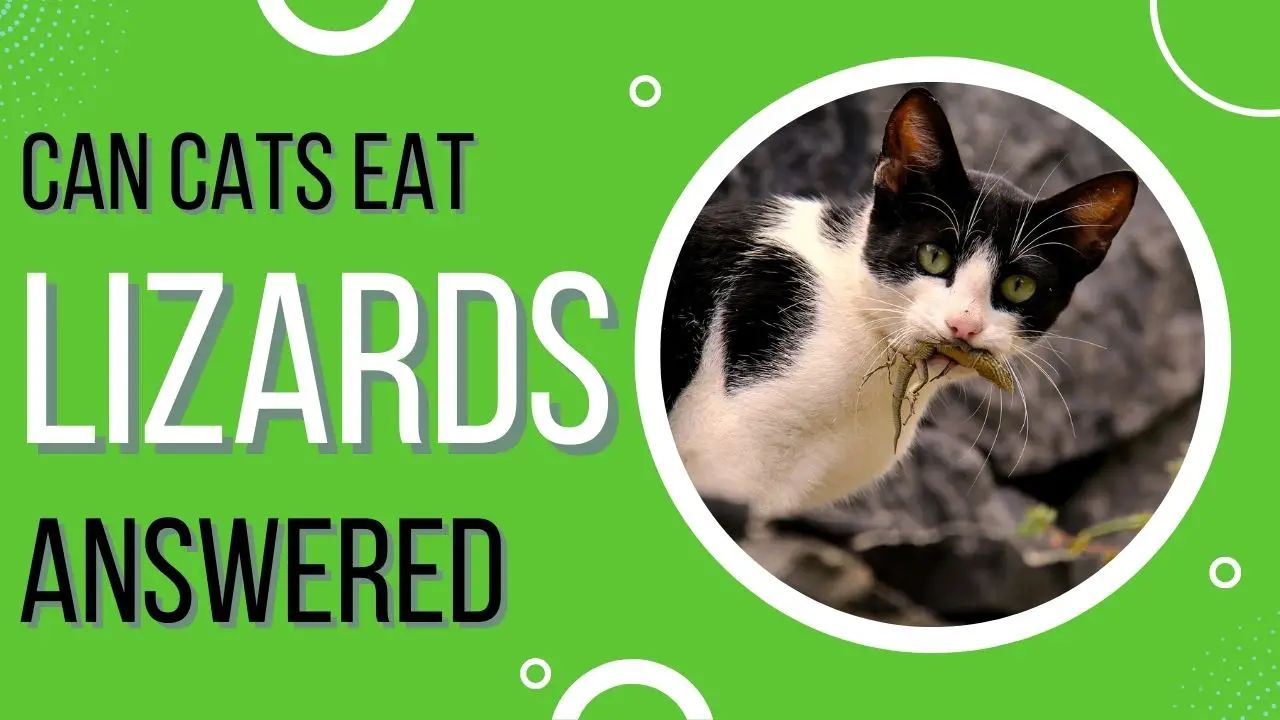- Top 10 Cat Names - March 4, 2024
- American Bobtail Cat Breed- Profile and Facts - July 8, 2023
- Black Cat Names 2023- With Meanings - June 28, 2023
Posted on August 2, 2021, | Updated on November 29, 2022
Key Take Aways:
- Cats can kill and eat lizards.
- Most Lizards are non-poisonous.
- Some poisonous lizards can be dangerous to your cat.
- A cat may show symptoms like shaking, giving out foam from the mouth etc on eating a poisonous lizard.
- House results are not poisonous but there is still a risk of causing infections, diseases and organ failure.
- Rush to the vet if you find your cat showing symptoms of toxicity.
- You must deworm your cat even if the lizard is non-poisonous.
OH MY GOD! My baby has just eaten a lizard! What should I do now? Is she going to die?
If your cat has eaten a lizard. It’s clear to you, this time she has put her life at risk due to her predatory nature. All of a sudden, you find yourself surrounded by negative thoughts. Thoughts that hijack our peace of mind. And, you find yourself completely stumped. Because you are too worried about what will happen next. Since this is something very strange, that has never happened in your life before.
Don’t panic! Take a deep breath and keep reading…
…Being a caring pet parent it’s pretty natural to get worried about the health of your cat. Especially, when she has consumed something that she shouldn’t.
However, the situation is not as bad as you think. It can be controlled.
So in this read, you will get to know what to do if your cat has eaten a lizard and how to avoid such incidents in the future.
Can Cats Eat Lizards?
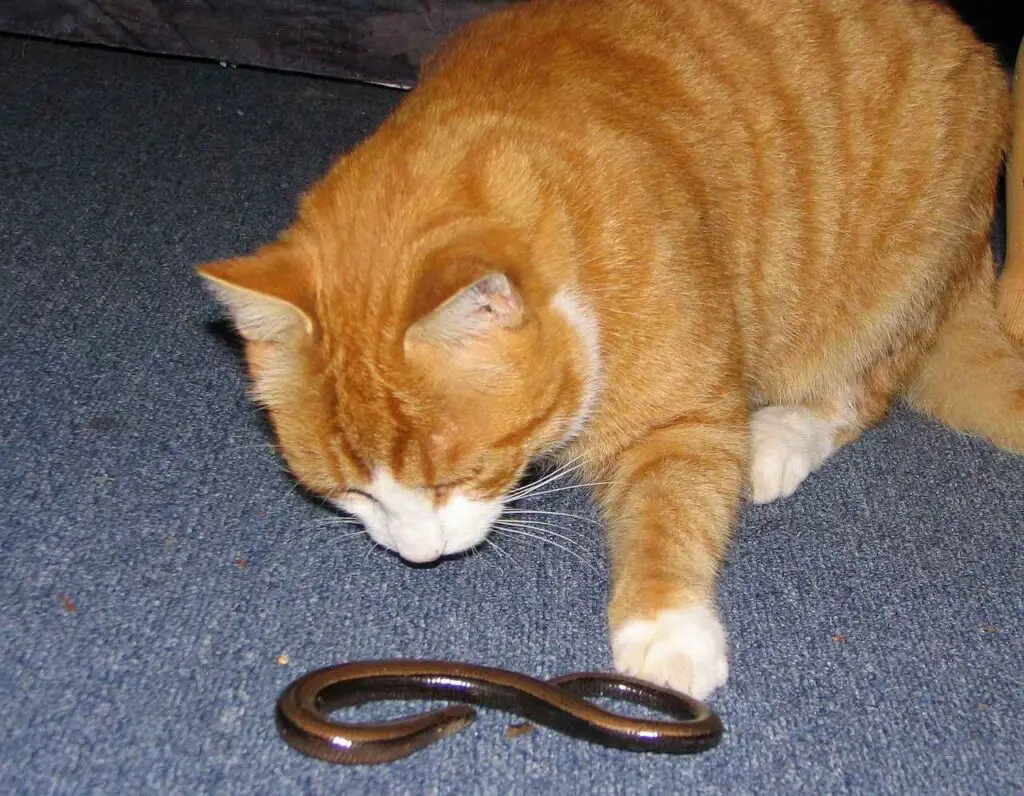
They can but they shouldn’t. Cats are natural predators and hunting is their instinct. They try to kill and eat any moving creature which appears to them as prey. No matter if she is a pet cat or a wild cat this is a common behaviour of all cats.
After killing their prey it’s common for cats to eat that. And they can eat lizards too.
So you should take every possible measure to stop your cat from eating them.
Anyways, lizards found in homes like geckos are completely non-poisonous. So if your cat has consumed one of those, it’s not a danger.
Also, the chances of her eating a lizard don’t need to be only when she is outside.
Sadly, some lizards can come to your home from the outdoors and become prey to your cat. So, it’s quite possible that your furry friend can start a lizard party anywhere, anytime. Hence, it is better to keep a watch on her whenever she goes outside or if you have lizards in your home.
Can Persian Cats Eat Lizards?
Yes, Persian Cats can eat lizards just like other cats. Although Persians are laid-back cats and don’t show much interest in hunting, they are still cats and can hunt, kill and eat anytime.
But there is a minimum possibility of this happening because Persians mostly like to spend time indoors. Even inside the house, they spend most of their time on the floor and at low heights. So, the probability of killing and eating lizards is very less when you have a Persian cat.
Do Stray Cats Eat Lizards?
Yes, stray cats can kill and eat lizards. In fact, the chances of such incidents happening are a lot higher in stray cats than indoor cats because stray cats have more access to wildlife than indoor cats.
Also, the level of severity is also higher among stray cats because poisonous lizards mostly live outside and stray cats are unlikely to get immediate medical help during adverse situations like this.
Is Eating Lizards Dangerous to Cats?
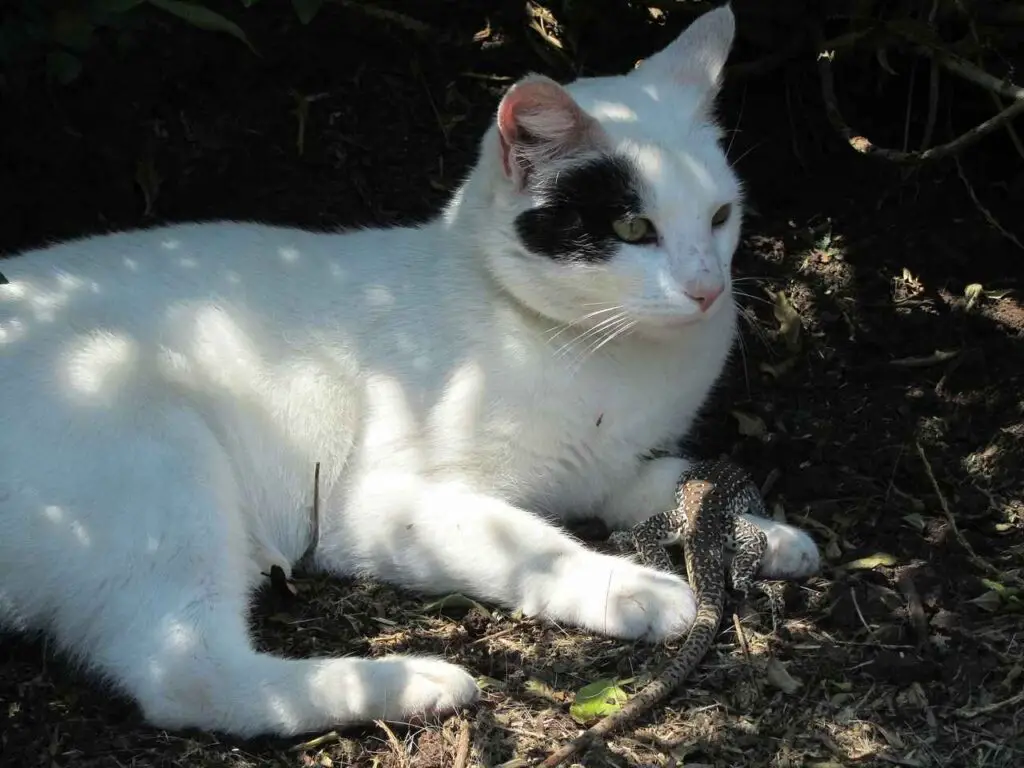
As I said above, lizards that are generally found in homes are not poisonous. Eating them wouldn’t be a direct health issue for your cat. However, two major problems are linked to the act of eating a lizard. They are:
I) Poisonous lizards like blue-tailed skinks and others can cause serious health problems to your cat. Some lizards have poisonous skin and eating them can be vulnerable to your cat. She can even die. So, be very sure to keep your cat away from lizards as much as you can.
II) Some lizards act as a carrier of a parasite called a liver fluke. When cats eat such lizards the parasites through lizards enter their body. This causes liver inflammation in some weeks if left untreated or diagnosed late.
A liver fluke is life-threatening to your cat. So be a close observer and watch what your cat is eating. Especially when she goes out.
My Cat Ate a lizard. What to do?
If the lizard was poisonous then you would notice some or all of the symptoms of poisoning. In that case, you must rush to the doctor as soon as you can.
Dr Furqan Arif of Aliyan Vets Has Spoken on This Issue
(Note* This video is in Urdu/Hindi so for our readers we have summarised and translated the major points in English.)
“Eating a lizard can be poisonous to the cat or not? It depends on whether the lizard itself is poisonous or not”, said Furqan.
According to him, “house cats are not poisonous to cats but ingesting them is still dangerous for cats to eat them because lizards’ and intestines have tonnes of parasites that may get into the body of your cat and may cause health problems such as damaging their liver in the long run.”
“If your cat has eaten a dark-coloured lizard with spotted skin, and she’s showing the symptoms of positioning such as tremors, vomiting or unresponsiveness then you must immediately rush to the vet otherwise this can be fatal”, said Dr Furqan.
Furthermore, “you must take your cat for deworming if she has eaten a lizard to avoid health-related problems”, he added.
What Could Happen If Your Cat Eats a Lizard: Symptoms
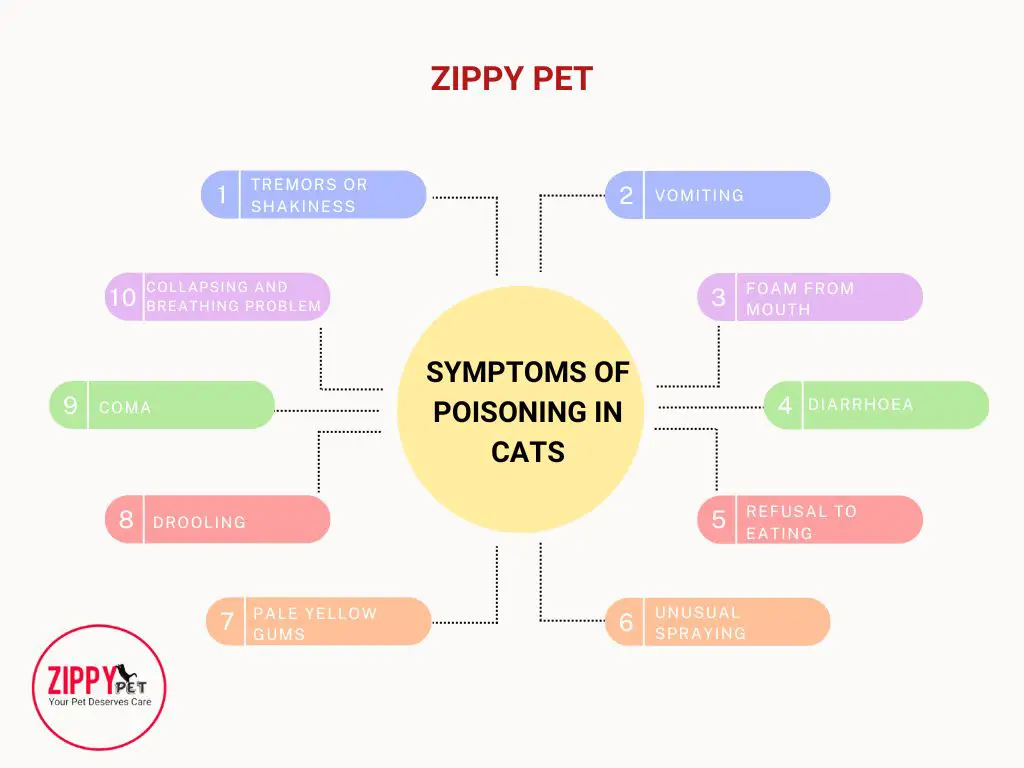
Symptoms That Your Cat Has Eaten Something Toxic:
After eating a lizard your cat may show the below-mentioned symptoms if the lizard was poisonous.
Although we are considering these symptoms in context to lizards these are the common signs and symptoms that a cat may show on consuming anything poisonous.
Symptoms That Your Cat Has Eaten Something Toxicity
According to Dunnellon Animal Hospital following are the symptoms of Poisoning in Cats:
- Tremors or Shakiness
- Vomiting
- Giving Out Foam From the Mouth
- Unresponsiveness
- Unusual Spraying and Bathroom Patterns
- Refusal from Eating Food
- Diarrhoea
- Pale Yellow Gums
- Drooling
- Coma
- Shock or Collapse
- Breathing Difficulties
- Skin Inflammation
- Coughing
- Abdominal Pain
- Unsteady Gait
- Lethargy
- Fever
- Jaundice
- Irregular Heartbeat
Why Do Cats Kill and Eat Lizards?
Well, the above image is enough to tell you why your cutie-sweetie eats those slimy reptiles. But, there is science behind this behaviour as well.
Look, cats are natural and opportunistic predators. Hunting is in their DNA. You can’t suppress this instinct by training or keeping her indoors. Hunting is her nature and you have to accept that as it is.
Onward.
Cats are more sensitive or you can say more alert to moving objects. When they see a lizard they see it as a toy to play with or as inviting prey.
The presence of a lizard is an opportunity for them to practice their corroded hunting skills. So, they waste no time giving a new edge to their hunting skills by catching and killing lizards and other small animals such as mice, birds, and frogs.
How Can I Stop My Cat From Killing Lizards?
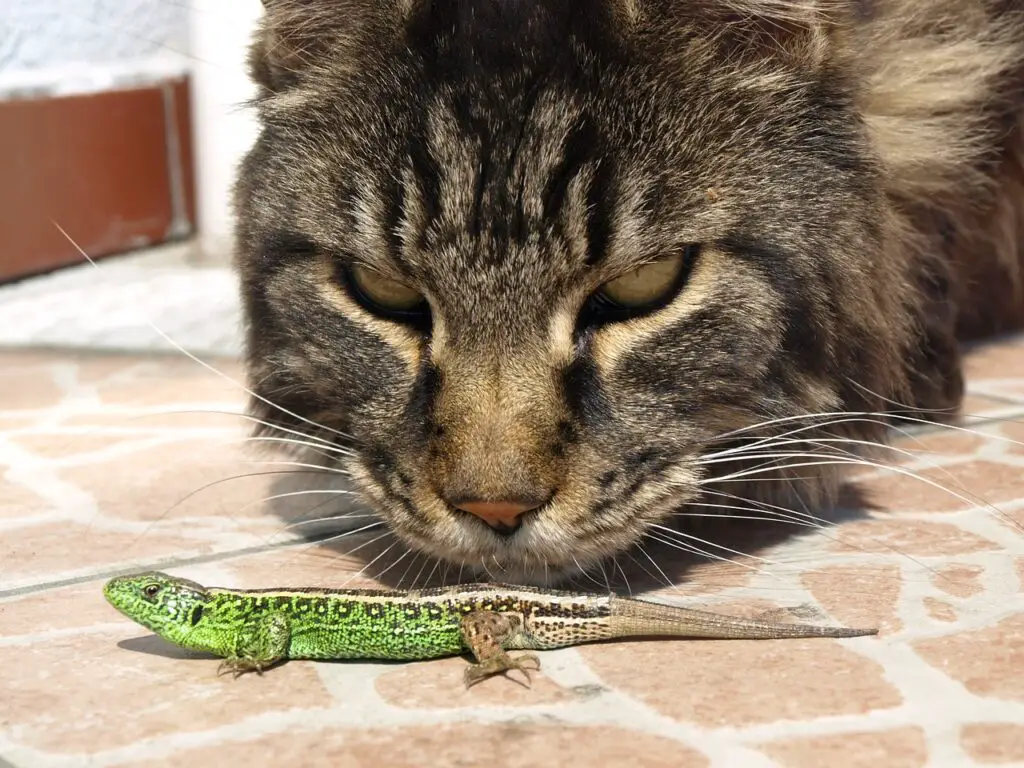
“How do you stop your cat from killing animals?” Well, it’s a million-dollar question. And, even before this, you may ask, “Can I stop my cat from killing lizards?” No matter which version of the question you may ask, the answer is Yes you can stop her by following some simple steps. Do this:
Step 1. Keep Your Cat Indoors
Your mission to stop your cat from killing lizards starts with training your badass cat to stay indoors. Environment and company play a dominating role in moulding the personality of children the same is the case with cats.
When she stays outside in the company of stray cats she’ll absorb their attitude and behave like them. One of the contrasting characteristics of stray cats is killing small animals. So your cats also learn to kill small animals from them.
But, it doesn’t mean that if you keep her indoors she’ll become a herbivore, she’s still a predator and can kill animals. This brought us to the next point to protect wildlife.
Learn how to enrich your cat’s indoor experience here.
Step 2. Use Bird-Safe Cat Collars
The second option you have to save innocent animals from your killer cat is using a bird-safe collar. These colours have vivid colours that are easily indexable. So, when your cat goes outside wearing these collars the other animals can easily see her and shift to a safer place.
According to Phys.Org, birds caught and killed by cats can reduce by as much as half using a cat collar.
Here is the list and reviews of the Best Cat Collars in India.
Step 3. Try a Cat Bell
Another option to stop your cat from killing animals is using a cat bell. As you know cat bell is one of the best options to alert other animals of your cat. Tie a collar with a hanging bell around your neck of your and forget. The rest of the work will be done by the bell.
The bell would alarm animals about the presence of a cat helping them to save their lives.
As per the research of Science Direct Journal, Cat Bells are effective in reducing the rate of predation by cats. Another research published by CSIRO, Australia states that “belled collars had reduced the catching of animals by the domestic cats by as much as half in Newzealand.”
Why Do Cats Bring Dead Birds and Animals Home?
It happens quite often, as soon as you open the door you find a corpse of a bird or other animal at your doorstep. Or you sometimes get puzzled by seeing the feathers of a bird, dispersed all over the balcony.
No, it’s not that someone is doing black magic in your home! These are the acts of your sweet-looking princess who cruelly kills small animals and brings them home.
Cats bring dead animals home because they want to teach you some hunting skills. For them, you are their silly friend who doesn’t lack hunting skills. So, they bring those poor injured and dead animals home to teach you what it takes to be a predator.
Can Cats Get Salmonella by Eating Lizards
According to FDA, Cats and Dogs have a minimum possibility to catch Salmonella. However, they can become the source of the spread of bacteria among humans.
Cats can spread the bacteria of Salmonella via their saliva or stools. The possibility of catching the bacteria increases when you clean the litter box. What to do then?
Sometimes cats can get infected by Salmonella if they are already suffering from any other disease.
You can identify whether you have been infected by Salmonella by the following symptoms:
- Diarrhea( with blood)
- Fever
- Vomiting
- Laziness or Decrease in Activity Level
- Loss of Appetite
How Does a Lizard Protect Herself From a Cat?
Well, the poor lizards don’t have much to save themselves from cats except those who are poisonous. But, they do everything they can to survive against cats. Some of these self-defence techniques are:
- Camouflage
- Spikes and Horns on their skin
- Venomous Bites
- Shedding of Tail
- Squirting of Blood
FAQs
Q1. Do cats kill lizards?
Yes, cats can kill lizards and eat them. Not only lizards cat kills other small wildlife too such as birds, squirrel, rabbit, chicks, mice, frogs and even snakes.
Q2. Can cats get sick from eating lizards?
Cats can get sick after eating lizards. This is because of two major reasons. Firstly, some lizards are poisonous, and eating them can kill your cat. Secondly, lizards carry pathogens in their bodies that can make your cat sick. This can even lead to death so, be careful.
Q3. Why do cats love lizards?
Cats are natural hunters and they see moving things as their prey. So, when they encounter a lizard they see it as their prey trying to catch and kill them. They also catch lizards to practice their hunting skills.
Q4. What if my cat eats a baby lizard?
If your cat eats a baby lizard she can still get infected by the parasites or killed by poison if the lizard that she has eaten is poisonous. So, it’s not about the size of the lizard it’s about the poison and parasites.
Q5. Are lizards afraid of cats?
Yes, lizards are afraid of cats. Lizards also know that cats are their enemy. So, they always try to save themselves from cats. This is the very reason why the households that have cats don’t have lizards.
Q6. Do Cats Eat Cockroaches?
Yes, cats show no mercy on cockroaches and eat them. Eating one or two cockroaches is not harmful to your cat but too many of them can create health issues such as intestinal problems.
Q7. Do cats eat snakes?
Yes, cats eat snakes and snakes eat cats. Let me explain. Cats like to hunt everything that is skittering in front of them. If it is a snake they give no respect and hunt that too. However, bigger snakes such as anacondas and pythons eat cats and gobble them.
Q8. Why do cats play with mice before they die?
Cats are predators by nature. Once they catch their prey they try to practice their hunting skills by catching the same prey again and again till the time they like or the prey dies. This is why cats play with mice before they die.
Q9. Can a rat kill a cat?
Rats cannot kill adult cats but they can kill small kittens. So, there is a possibility of killing younglings of cats by rats. Adult cats have no life-threatening danger with rats. However, big rats can scare some cats and attack them.
Q10. Can a cat eat a bearded dragon?
No, cats don’t kill bearded dragons. In fact, some people keep both bearded dragons and cats as pets in the same household. Cats do not attack them like they do with small lizards such as geckos. This may be because of their dangerous looks or big size that cats don’t dare to attack them. Instead, they keep a friendly relationship.
